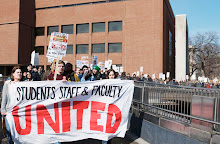Most of you know by now that the Faculty Senate approved Bruininks' motion to cut faculty salaries by 1.15%. Of course we are very disappointed that our resolutions did not pass, but we think that there is reason for optimism. (Note: This report could have been much longer, as there was much parliamentary maneuvering that occurred at the meeting that is not described below. It would make your head spin and perhaps bore you to death, so we opted for brevity.)
The meeting opened with Bruininks giving a ten-minute speech, decorated with the same vapid PowerPoint slides that we have all seen. Asserting that his plan was the most even-handed and fair, he dismissed a sliding scale model because it would disproportionately affect our "best" faculty and encourage them to engage in "job-seeking behavior." Bruininks deemed this too high a price to pay to shield the lowest-paid workers at the U from pay cuts. "I'll be quite blunt about this," he said, "this is the only plan at this point on the table and being discussed today that I'm willing to consider." He concluded by stating that the issue of the day was whether faculty are "willing to make a really modest contribution in the short-term to help solve a long-term issue facing the University of Minnesota."
FCC Vice-Chair Michael Oakes then presented the motion on behalf of the FCC, which was unanimous in its support of Bruininks proposal. Eva von Dassow spoke in opposition to the motion. Debate proceeded for about an hour, with numerous FCC and other Senate committee members, or their alternates, weighing in to support Bruininks' proposal. Many spoke to the issue of "sharing the pain" or "taking one for the team" as a way of urging support for Bruininks' motion, completely ignoring the fact that our Resolution on Salary Reduction was intended to do just that, while at the same time protecting the most vulnerable workers.
Our first substitute motion, the Resolution on Financial Stringency, was presented by Eva von Dassow. Our demand for the administration to justify its expenditures struck a chord. Although there were some doubts raised about our use of the word "audit," as well as a call for providing more specific items for auditors to investigate, a number of senators noted that the administration has not enunciated a long-term plan for how to deal with reductions in state allocations and that the issues raised by the resolution are important and should be part of discussions about developing long-term solutions. Michael Oakes, Vice-Chair of the FCC, made a friendly amendment to our resolution that removed the following clause from the third paragraph of the resolution: "prior to asking the Faculty Senate to vote on its proposal to reduce faculty compensation." By removing this clause, our motion was no longer a substitute motion but a separate, independent motion. The motion was then referred to committee for further action.
The second substitute motion, the Resolution on Salary Reductions, was presented by Karen-Sue Taussig. After little debate and extensive parliamentary maneuvering, the motion was voted on and was defeated by quite a large margin. Although the motion was defeated, there was a lot of support for the idea of a sliding scale and for shielding the lowest-paid workers from pay cuts. The main criticism of the sliding scale cut was that imposing larger cuts on more highly-paid individuals would drive away "rainmakers." Making those who earn more take a bigger hit, some argued, would produce a brain drain and allow other universities to "cherry pick" our best faculty. Some openly doubted the veracity of this claim, noting that most universities are facing major budget problems. (Not to mention that the argument shows quite starkly the administration's dubious conflation of high pay with quality of scholarship and its assumption that our best faculty only care about making a lot of money--neither is true, of course.)
The main concern voiced regarding the sliding scale had nothing to do with the sliding scale per se but rather the non-binding character of Faculty Senate resolutions. If our Resolution had passed, Bruininks could have ignored it and simply imposed deeper cuts on academic units, which would have had two consequences that concerned many people: first, the administration would portray this as faculty voting "no" on paycuts, which would reflect badly on faculty and incur wrath from legislators and the public; second, that the cuts to units would hurt the very people we were trying to protect with the sliding scale proposal.
After the Resolution on Salary Reductions was voted down, Bruininks' motion became the only remaining motion. At this point, Bill Beeman made a motion to suspend the rules, in hopes that we could then amend Bruininks' motion and replace the across-the-board cut with a sliding scale. There was a palpable change in energy in the room at this moment. Bill Beeman almost withdrew the motion, since a previous effort to suspend the rules was voted down, but audible "whys?" came from many senators. A two-thirds majority was required to suspend the rules, and unfortunately we did not get enough votes. The votes were not counted, but a lot of cards went up to support the motion to suspend the rules. By our estimate about half of the senators were in favor of suspending the rules. Senators then voted on Bruininks' motion, which passed. (Many senators seemed to think that amending Bruininks' motion would have bound him to carry out the sliding scale, but we are uncertain of this. The tenure code requires the President to obtain faculty assent in order to cut our salaries, but the Senate Constitution states that Senate resolutions are non-binding on the administration.)
It is worth noting the irony of this situation. The very impotence of faculty governance is what caused many faculty to hold their noses and vote for Bruininks' motion. The other striking fact is that the concerns raised reflected a profound lack of faith in Bruininks. Many faculty believed that he would simply ignore a resolution adopted by the highest governing body of faculty at the University.
Of course, there is an alternative argument that received little direct endorsement by those speaking at the Faculty Senate, an argument that Karen-Sue Taussig valiantly conveyed: it is our ethical obligation to take bigger pay cuts so that those who make least do not take a cut. After voting to endorse the sliding scale, the ball would have been in Bruininks' court. He would then have had two choices: ignore faculty and go forward with his plan or come back to faculty with a sliding scale cut. If he decided to do the former and not the latter, that makes him look bad, not us. The headlines could have read: "Faculty Vote to Take Bigger Cuts to Protect Low-Paid Workers at the U." But in the end, the frames "voting no on Bruininks plan = voting no on pay cuts" and "voting no on Bruininks plan = imposing layoffs on staff," won the day. People voted out of fear of the havoc Bruininks would wreak if we defied him. He held a knife to our throats by threatening to hurt those we were trying to protect if we did not bend to his will. Faculty should be outraged by these hardball tactics and the contempt they show for having faculty participate, rather than merely being consulted, in the governing of our University.
Although we did not achieve all that we had hoped, we think that we accomplished quite a lot given that FRPE has been in existence for less than two months. We stirred things up at the Faculty Senate and forced the administration to mount a vigorous defense of its policies. Numerous FCC members rose to speak in defense of the President's plan, as did many people who served on senate committees. (The notable exception was Joe Konstan, a faculty senator serving on the finance committee, who voiced a scathing critique which you can view here: http://ptable.blogspot.com/2010/03/he-won-battle-but-is-losing-war.html#links) The playing field was uneven, and we are less experienced than those who were behind Bruininks' plan, so we did get bloodied a bit, but we have learned from the experience and will be stronger and better-prepared the next time around.
So where do we go from here? The Faculty Senate meeting only became a focus of our organizing efforts in the short-term because our strong tenure code gave us a golden opportunity. Our long-term struggle remains the same: transforming the University of Minnesota. So now is the time to renew our efforts and plan next steps. We will meet next week (TBA) to reflect on what transpired this week and to plan for the future. We hope that you will attend.
Friday, March 26, 2010
Subscribe to:
Post Comments (Atom)


For low quality videos (two parts) of the Senate meeting:
ReplyDeletehttp://blog.lib.umn.edu/bgleason/pt/2010/03/another_attempt.html
My apologies for the quality, but size limitations on uploaded files made this necessary.
I have filed a petition with the Office of Conflict Resolution and a grievance with the Senate Judicial Committee. These deal with the President's non-compliance with the tenure code rules for dealing with financial emergencies and the administrative actions that are required for faculty salary reduction.
I'm a relatively new grad student at the university, I just want to say thank you for your efforts on this. The current economic situation makes me question my decision to pursue graduate education. President Bruininks' behavior makes me question my decision even more, if this is how senior decision makers in higher education behave then I'm not sure I want to be in higher education. It helps me stay hopeful to know that many faculty are not going to take this sitting down.
ReplyDeleteAs a veteran of the attempt to form a faculty union in the late 90s, I suggest that we will only have real power if we have a union, and that this is something we should be working for right now.
ReplyDeleteIn contrast to our lack of power in MN, a friend at the University of Leeds, UK, where Management is considering shutting down the Classics Dept, writes that threats of stike action by the union have been very effective in preventing arbitrary decisions.
Betty Belifiore, Classical and Near Eastern Studies
I've got a video up that is a selection of some of the more objectionable things President Bruininks had to say at the faculty senate meeting.
ReplyDeleteBy themselves his statements are damaging, but I intend to add some response to what he had to say in the Mark II version of the video. If anyone can watch it and wants to forward any suggestions to imbed in the response, please let me know.
William B. Gleason (I'm in the U directory)
http://ptable.blogspot.com/2010/03/president-bruininks-to-university-of.html
Hello nice blog
ReplyDelete